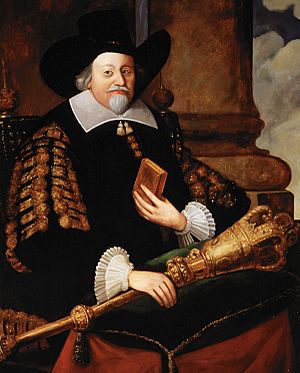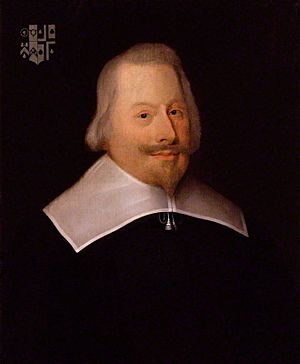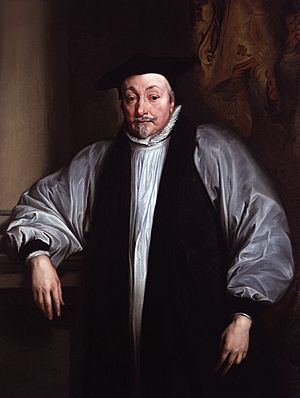Francis Rous facts for kids
Quick facts for kids
Francis Rous
|
|
|---|---|

Francis Rous
|
|
| Member of Parliament for Cornwall |
|
| In office 1656 – 1659 † |
|
| Member of Parliament for Truro |
|
| In office 1654–1655 |
|
| Speaker of the House of Commons | |
| In office 1653–1653 |
|
| Provost, Eton College | |
| In office 1644–1659 |
|
| Member of Parliament for Tregony |
|
| In office 1628–1629 |
|
| Personal details | |
| Born | circa 1581 Dittisham, Devon |
| Died | 7 January 1659 (aged 77) Acton |
| Resting place | Eton College Chapel |
| Nationality | English |
| Spouse | Philippa (1619–1657) |
| Children | Francis Rous (1615–1643) |
| Parents | Sir Anthony Rous (c.1555–1620) Elizabeth Southcote (1547-1585) |
| Relatives | John Pym (stepbrother) |
| Alma mater | Pembroke College, Oxford Leiden University |
| Occupation | Politician and theologian |
Francis Rous (around 1581 to 1659) was an English politician and a religious writer. He was known as a Puritan, which meant he wanted to "purify" or reform the Church of England. From 1644 to 1659, he was the Provost of Eton College, which is like being the head of a school. For a short time in 1653, he was also the Speaker of the House of Commons, leading important meetings in Parliament.
Francis Rous was the stepbrother of John Pym, a famous leader in Parliament. Together, they opposed certain religious ideas, especially those of William Laud, who was the Archbishop. Rous played a big part in trying to remove Archbishop Laud from his position. When the First English Civil War started in 1642, Rous supported the Parliament side. He also helped create the Solemn League and Covenant, an agreement between England and Scotland. He was part of the Westminster Assembly, a group that discussed how to reform the Church.
Later, during the time when Oliver Cromwell ruled England (called the Protectorate), Rous became friends with Cromwell. He moved away from his earlier religious group, the Presbyterians, and became closer to the Independents. Francis Rous passed away in January 1659 and was buried at Eton College Chapel.
Contents
Early Life and Family
Francis Rous was born in a place called Dittisham in Devon, England, around the year 1581. He was the fourth son of Sir Anthony Rous and his first wife, Elizabeth Southcote. His father later married Philippa Colles, who was the mother of John Pym. This made John Pym Francis's stepbrother, and they became very close friends and political allies.
Sometime after 1601, Francis Rous married a woman named Philippa. They had a son named Francis, born in 1615, who became a talented scholar and doctor.
Political and Religious Career

Francis Rous's father, Sir Anthony Rous, was a very religious man and a strong Puritan. He taught his children these same values. Francis studied at Pembroke College, Oxford, which was known for its strong Protestant beliefs. In 1598, he went to the University of Leiden in the Netherlands. This university was an important place for English and Scottish Calvinists, another group of Protestants.
In the early 1600s, it was common for educated people to study law. So, Francis briefly attended the Middle Temple, a law school, in 1601. After that, he moved to Landrake in Cornwall. We don't know much about his life before 1626, but he did write several books. In 1641, Rous said he traveled in Europe in 1609 with Sir Thomas Overbury, who later became famous because of a murder case.
Religion's Role in 17th Century Life
To understand people from this time, it's important to know how central religion was to daily life and politics. Most people believed in one main church that everyone should belong to. The big debates were about how that church should be run, especially within the Church of England. People believed that good government depended on having the "true religion." Many also thought that the Second Coming (Jesus's return) was coming soon, which made these religious discussions feel very urgent.
The term "Puritan" was used for anyone who wanted to "purify" the Church of England. The most well-known Puritans were the Presbyterians. Most of these groups saw themselves as part of the national church. Those who were forced out later by a law in 1662 became known as Nonconformists.
Opposing Archbishop Laud

Like his stepbrother John Pym, Francis Rous strongly disagreed with Arminianism. This was a different set of religious ideas that Puritans felt were too close to Catholicism. Between 1619 and 1623, Rous published books that criticized certain religious practices he saw as wrong.
In 1626, Francis Rous was elected as a Member of Parliament (MP) for Truro. An MP is a person elected to represent an area in Parliament, helping to make laws. He was later elected for Tregony in 1628. Rous and Pym led the effort against two clergymen, Roger Maynwaring and Robert Sibthorpe. These clergymen had published speeches supporting the idea that kings had a "divine right" to rule and that people should always obey them. Parliament saw these ideas as a threat to their own power.
In a speech in January 1629, Rous warned that if Arminianism continued to spread, "true religion" would be lost. This speech greatly influenced the opposition to William Laud, who was the Archbishop of Canterbury. King Charles I responded by shutting down Parliament, beginning a period called the Personal Rule, where he ruled without Parliament until 1640.
Parliament and Civil War
When Parliament was called back in 1640 (this was known as the Long Parliament), Rous was again elected for Truro. In December 1640, he started the debate about whether Archbishop Laud's religious changes were legal. In 1641, he presented formal accusations, called articles of impeachment, against another clergyman, John Cosin.
Francis Rous was part of the Westminster Assembly, a group of religious leaders and politicians who worked on reforming the Church of England. He also signed the Solemn League and Covenant, an agreement made in 1643 between English Parliamentarians and Scottish Covenanters during the English Civil War. In 1644, he became the Provost of Eton College, a position he held until his death in 1659.
Psalms and Later Years
In 1643, Rous published his own versions of the Book of Psalms set to music, called The Psalms of David set forth in English meeter. These were meant to be used in churches in England and Scotland. His work was later changed by a committee, and in 1650, his Psalms were approved for use by the General Assembly of the Church of Scotland. Even with the changes, Rous's words for Psalm 23 are generally thought to be the basis for the well-known Christian song, "The Lord's my Shepherd".
After 1647, Rous became closer to the Independents, a religious group that included Oliver Cromwell. He supported the decision to execute King Charles I in 1649. This was a difficult time because many Presbyterians believed a king was necessary for a well-ordered society. In April 1649, Rous published a pamphlet arguing that the Bible required people to obey the government, no matter who was in charge.
In early 1652, he served on a committee that aimed to spread the Gospel. He was appointed Speaker of the House of Commons in 1653. However, he found it hard to control the strong disagreements among the Members of Parliament in what was known as Barebone's Parliament. Rous and others became worried about how extreme some MPs were. In a planned move on December 12, 1653, he led moderate members to Cromwell's office. There, they resigned their powers, which effectively ended that Parliament.
He was an MP for Cornwall in 1656. His wife, Philippa, became very ill and passed away in December 1657. Francis Rous died shortly after, in January 1659. In his will, he left money for his grandson and also funded three scholarships for students from Eton College to attend Pembroke College. He was buried in Eton College Chapel.
Images for kids
-
Rous' stepbrother and friend, John Pym
-
Rous strongly opposed Archbishop Laud, who was executed in 1645
 | Misty Copeland |
 | Raven Wilkinson |
 | Debra Austin |
 | Aesha Ash |




